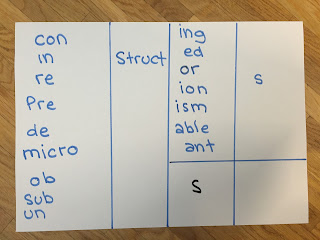This wondering aroused quite a bit of curiosity so we used it today to continue exploring our question:
CAUSATION: Why are English words spelt the way they are?
We reflected by sharing what we had already discovered about this question and then I reminded them of the question that arose yesterday about the spelling of THEIR.
I wrote THERE THEIR and THEY'RE on the board and we did a turn-n-talk about what we knew about these three words.
We shared our understandings and this great question emerged:
If they are pronounced the same, why don't we just spell the the same way?
Some of us felt they need to be spelt differently because they have different meanings and so when we read we know the meaning. - great!
We then looked at THERE and by already understanding it means a place or position or existing, we thought about other words that connect with it.
Eventually we discovered how THERE WHERE and HERE all have HERE inside them. This helped us to create a memory hook of how not to misspell where / were / we're. If we remember HERE is in the word WHERE we won't mix them up.
We repeated this for THEIR and came back to our original question of why isn't it spelt THIER.
Eventually we found the connection of THE in THEIR, THEM, THEY.
One student suggested a memory hook of THE person in THEIR could help us.
Knowing that THEIR THEM THEY all have THE in them can help us to remember how to spell THEIR and it helps us understand why it isn't spelt THIER.
We used this understanding to see how if we understand DOES comes from the word DO then that memory hook can help us to not misspell it as DEOS.
When we looked at THEY'RE, our first theory was that the apostrophe replaces A letter. We thought about this and then some students challenged us to think about WE WILL or WE SHALL; in these instances the apostrophe is actually replacing more than one letter.
We then had a scavenger hunt (below) examples of THERE THEIR THEY'RE in reading books and then students were encouraged to write wonderings they have about English spelling which we will examine later in the week.
With many thanks to Pete Bowers for his amazing PD that taught me so much!
























